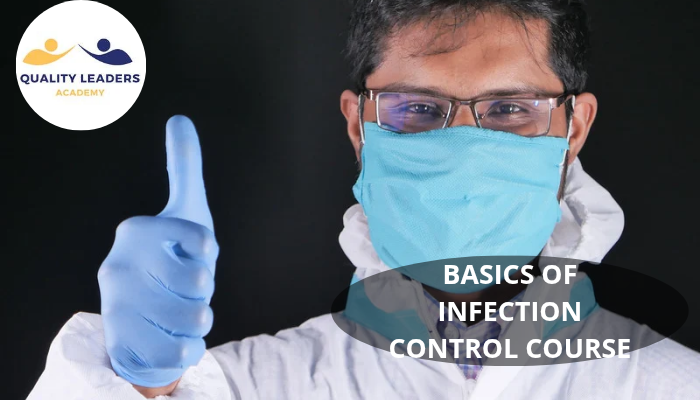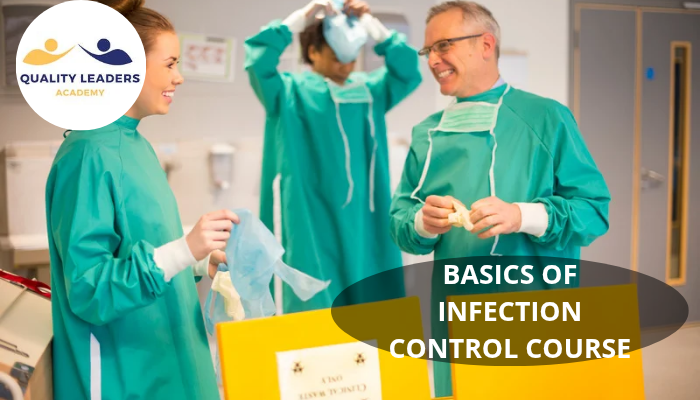Infection control in healthcare is important for keeping patients safe and minimizing the transmission of contagious diseases.
Effective infection prevention, measures safeguard healthcare workers, patients, and the general public.
One of the most popular credentials in this context is Certification in Infection Control (CIC), which demonstrates proficiency in infection prevention and epidemiology. Nurses and health workers intending to advance their careers in infection control may obtain the CIC certification by taking specialized courses from institutions like Quality Leaders Academy, which is a commendable step toward career growth.
WHAT IS AN INFECTION CONTROL COURSE?

An infection control course is a structured educational program designed to equip healthcare professionals with the knowledge and skills needed to prevent and manage infections in clinical settings. These courses cover essential topics such as microbiology, epidemiology, sterilization techniques, hand hygiene, and compliance with healthcare regulations. They prepare participants for certification exams like the CIC (Certification in Infection Control) and help professionals implement best practices for infection prevention in hospitals, clinics, and other healthcare facilities.
What Are the 7 Standards of Infection Control?
The seven standards of infection control are fundamental principles that ensure a safe and hygienic environment for both patients and healthcare workers:
1. Hand Hygiene: Proper handwashing and sanitization to prevent pathogen transmission.
2. Use of Personal Protective Equipment (PPE): Wearing gloves, masks, gowns, and eye protection when necessary.
3. Sterilization and Disinfection: Ensuring medical tools and surfaces are properly cleaned and sanitized.
4. Respiratory Hygiene and Cough Etiquette: Encouraging proper coughing and sneezing practices to prevent airborne infections.
5. Safe Injection Practices: Using sterile needles and preventing cross-contamination in medical procedures.
6. Environmental Cleaning: Regular cleaning and disinfection of patient rooms, shared surfaces, and medical equipment to minimize contamination.
7. Waste Management: Safe disposal of medical and biological waste to prevent infection spread.
These seven infection control standards form the foundation of effective infection prevention programs in healthcare settings.
IMPORTANCE OF CBIC CERTIFICATION
The Certification Board of Infection Control and Epidemiology (CBIC) administers the CIC certification, the gold standard for infection preventionists. This certification demonstrates a healthcare professional’s expertise in:
- Preventing and controlling infectious diseases in clinical settings.
- Implementing evidence-based infection control programs.
- Educating staff on best practices to reduce infection risks.
- Conducting surveillance and outbreak investigations.
Holding a CIC certification enhances career prospects and boosts credibility and professional recognition. Many hospitals and healthcare institutions prefer or require CIC certification for infection control professionals, making it a valuable credential for career growth.
INFECTION CONTROL COURSE AT QUALITY LEADERS ACADEMY
Quality Leaders Academy offers specialized courses designed to prepare healthcare professionals for the CIC exam and infection prevention roles. Their training programs provide:
Comprehensive learning materials:
Covering all CBIC exam domains, including epidemiology, surveillance, and regulatory standards.
Live interactive sessions:
Engaging lectures with expert instructors.
Exam-focused preparation:
Realistic practice exams and case studies.
Flexible learning options:
Online access to study resources and recorded sessions.
Enrolling in infection control courses allows healthcare workers to gain the in-depth knowledge and hands-on skills required to excel in infection prevention.
KEY TOPICS COVERED IN INFECTION CONTROL COURSES

A well-structured infection control course provides in-depth training on crucial topics, including:
- Microbiology and Epidemiology, understanding pathogens and how infections spread.
- Surveillance and Risk Assessment, identifying and mitigating infection risks.
- Outbreak Investigation, analyzing and controlling infection outbreaks in healthcare settings.
- Standard and Transmission-Based Precautions, guidelines for preventing pathogen transmission.
- Environmental Hygiene, best practices for sterilization and disinfection.
- Regulatory Standards and Compliance, meeting guidelines set by CBIC, CDC, WHO, and other health organizations.
These topics ensure that professionals are well-prepared to implement effective infection control strategies in their workplaces.
BENEFITS OF OBTAINING INFECTION CONTROL CERTIFICATION
Earning an infection control certification, particularly the CIC, provides numerous advantages:
- Career Advancement: Many hospitals and healthcare facilities prefer or require certified professionals for infection control roles.
- Higher Salary Potential: Certification often leads to better job prospects and increased earning potential.
- Enhanced Knowledge and Skills: CIC-certified professionals are equipped with the latest infection prevention techniques.
- Regulatory Compliance: Helps institutions meet healthcare accreditation and safety requirements.
As infection control becomes an increasing priority worldwide, certified professionals will continue to be in high demand.
Infection control is essential for maintaining safe healthcare environments and preventing the spread of diseases. The CIC certification serves as a benchmark for expertise in this field, opening doors to career advancement and professional recognition.
For those looking to gain infection control certification, enrolling in a specialized training program like that offered by Quality Leaders Academy is a strategic investment. With expert-led courses, comprehensive study materials, and exam-focused training, healthcare professionals can confidently prepare for and pass the CBIC exam, taking their careers to the next level.
Resources:
https://www.cdc.gov/infection-control/hcp/basics/standard-precautions.html?utm_source=chatgpt.com
https://www.infectioncontroltoday.com/view/the-value-certification-infection-prevention-control-why-is-important-


